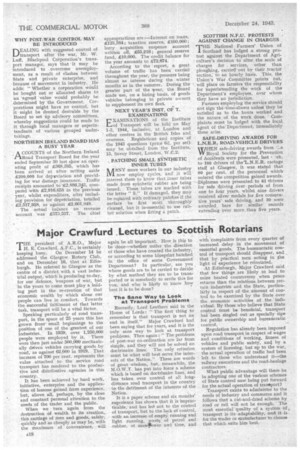Major Crawfurd Lectures to Scottish Rotarians
Page 20

If you've noticed an error in this article please click here to report it so we can fix it.
THE president of A.R.O., Major H. E. Crawfurd, A.F.C., is certainly keeping busy. On December 14 he addressed the Glasgow Rotary Club, and on December 16, that at Edinburgh. He referred to Glasgow as the centre of a district with a vast industrial output, which is producing to-day, for our defence, iveapons of war, but in the years to Come must play a leading part in the re-creation of that economic wealth by which alone our people can live in comfort. Towards the -successful fulfilment of that latter task, transport will be a vital factor.
Speaking particularly of road transport, in the space of 25 years this has grown fromsmall beginnings to the position of one of the greatest of our industries. In 1939, over 1,250,000 people were employed by it. There were then just under 500,000 mechanically driven vehicles carrying goods by road, as against 62,000 in 1919. That increase of 700 per cent, represents the value attached to the service road transport has rendered to the productive and diktributive agencies in this country.
It has been achieved by hard work, initiative, enterprise and the application of lessons gained from experience, but, above all, perhaps, by the close and constant personal attention to the needs of the trader and the public.
When we turn again from the destruction of wealth to its creation, this carriage of men and goods, safely, quickly and as cheaply as may be, with the maximum of convenience, will
again be all important,. How, is thi g to be chine—whether under the direction of those who have created the industry, or according to some blueprint hatched in the office of some Government' Department? In particular, are you whose goods are to be carried to decide by what method they are to be transported or is somebody to settle this for you, and who is likely to know how best it is to be done?
The Sane Way to Look at Transport Problem! • Recently, Lord Leathers' said in the House of Lords: " The first thing to remember is that transport is not an end in itself." Major Crawfurd had been saying that for years, and it is the only sane way to look at transport problems. Then again : "The problems of post-war co-ordination are far from simple, and they will not be solved on doctrinaire lines. The only criterion must be what will best serve the interests of the Nation." These are words of great wisdom, but, meanwhile, the M.O.W.T. has put into force a scheme which is based on doctrinaire lines, and has taken over control of all longdistance road transport in the country to the detriment of the interests of the Nation.
It is a paper scheme and six months' experience has shown that it is impracticable, and has led not to the control of transport, but to the lack of control, with an increase of empty running and light running, waste of petrol and .rubber, of man-PoWer and time, and
with complaiats from every quarter of increased delay in the movement of essential goods. The bureaucratic con.trol of transport should disappear, and that by practical men acting in the light of experience be reinstated.
At Edinburgh, Major Crawfurd said that few things • are likely to lead to more heated controversy when peace returns than the relations between ,centain industries and the State, particularly in respect of the amount of control to be exercised by the State over the economic activities of the individual. By those who believe that State control must be beneficial, transport has been singled out as specially ripe for public ownership and bureaucratic control.
Regulation has already been imposed upon road transport in respect of wages and conditions of working, fitness of vehicles and public safety, an4 by a system of licensing, but up to the war, the actual operation of traffic had been left to those who understand it—the railway executives and the road-haulage contractors.
What public advantage will there be in adopting one of the various schemes of State control now being put forward for the actual operation of traniport?
Transport exists to administer to the needs of industry and commerce and it follows that a cut-and-dried scheme by road or rail will not be enough. ' The most essential' quality of a system of transport is its adaptability, audit is for the trader or manufacturer to choose that which suits him best.




















































